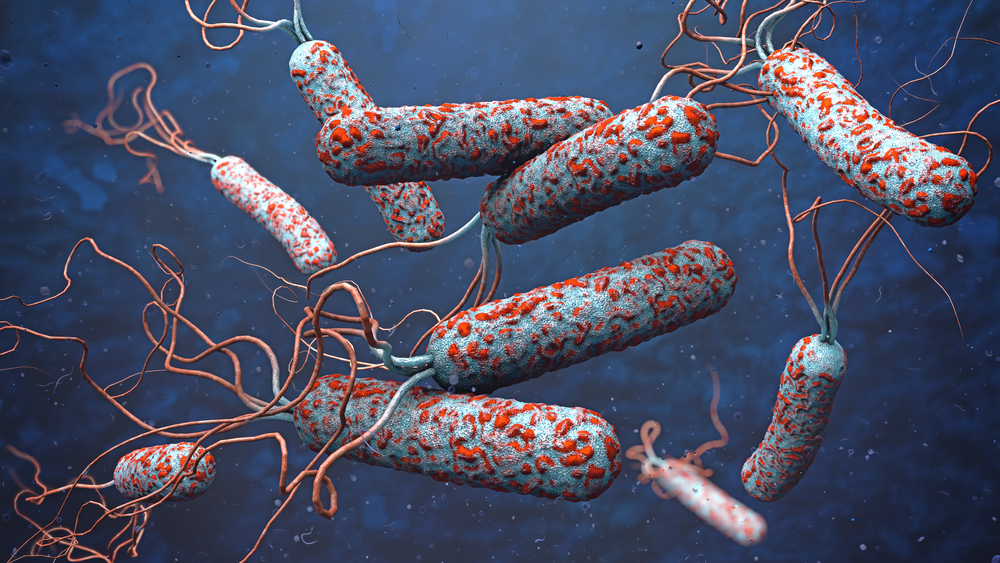
MIT engineers have developed a probiotic mix of natural and engineered bacteria to diagnose and treat cholera, an intestinal infection that causes severe dehydration.
Cholera outbreaks are usually caused by contaminated drinking water, and infections can turn fatal if not treated. The most common treatment is rehydration, which must be done intravenously if the patient is extremely dehydrated. However, intravenous treatment is not always available to patients who need it, and the disease kills an estimated 95,000 people per year.
The MIT team’s new probiotic mix could be consumed regularly as a preventative measure in regions where cholera is common, or used to treat people soon after infection occurs, says James Collins, the Termeer Professor of Medical Engineering and Science in MIT’s Institute for Medical Engineering and Science (IMES) and Department of Biological Engineering.
“Our goal was to use synthetic biology to develop an inexpensive means to detect and diagnose as well as suppress or treat cholera infections,” says Collins, who is the senior author of the study. “If one could inexpensively and quickly track the disease and treat it with natural or engineered probiotics, it could be a game-changer in many parts of the world.”
The lead authors of the paper, which appears in the June 13 issue of Science Translational Medicine, are former Boston University graduate student Ning Mao, MIT postdoc Andres Cubillos-Ruiz, and former MIT postdoc D. Ewen Cameron.
Detection and treatment
To create their “living diagnostic” for cholera, the researchers chose a strain of bacteria called Lactococcus lactis, which is safe for human consumption and is used in the production of cheese and buttermilk.
They engineered into this bacterium a genetic circuit that detects a molecule produced by Vibrio cholerae, the microbe that causes cholera. When engineered L. lactis encounters this molecule, known as CAI-1, it sets off a signaling cascade that turns on an enzyme called beta-lactamase. This enzyme produces a red color that can be detected by analyzing stool samples. This process now takes several hours, but the researchers hope to shorten that time.
The researchers had hoped to further engineer L. lactis so that it could treat or prevent cholera infections. They began by engineering the microbes to produce antimicrobial peptides that could kill V. cholerae, but they eventually found that the peptides were being rendered harmless after being secreted by the cells.
Serendipitously, however, the team discovered that unmodified L. lactis can actually kill cholera microbes by producing lactic acid, a natural byproduct of their metabolism. Lactic acid makes the gastrointestinal environment more acidic, inhibiting the growth of V. cholerae.
The engineered version of L. lactis does not produce enough lactic acid to kill cholera microbes, so the researchers combined the engineered bacteria with the unmodified version to create a probiotic mixture that can both detect and treat cholera. In tests in mice, the researchers found that this probiotic mixture could successfully prevent cholera infections from developing and could also treat existing infections.
Alternatives to antibiotics
Collins says he anticipates that the probiotic, which could be incorporated into a pill or a yogurt-like drink, could be used either as a preventative measure or for treating infections once they begin. Having the ability to diagnose cholera easily could also help public health officials detect outbreaks earlier and monitor the spread of the disease.
The researchers are now exploring the possibility of using this approach to combat other microbes, such as Clostridium difficile, which causes gastrointestinal infections, and bacteria known as enterococci, which can cause many types of infections.
“There is emerging interest in using probiotics to treat disease, largely from the growing recognition of the microbiome and the role it plays in health and disease, and the pressing need to find alternatives to antibiotics,” Collins says.




